|

| |
Kommt... wir nehmen Euch durch S�dostasien mit...
Seit unserer Ankunft in Thailand im April 98 versuchen wir so oft wir
k�nnen, w�hrend der Feiertage und langen Wochenenden das Land und die Umgebung zu
entdecken.
Hier k�nnt Ihr einen Eindruck bekommen, was wir bis jetzt gemacht
haben.... wir hoffen, Ihr kommt auch auf dem Geschmack !
 | Bangkok (Krungthep in thai !)
|
Es gibt vieles zu sehen in Bangkok und wir wollen jetzt nicht die
Reisef�hrer ersetzen, aber ein paar Bilder...
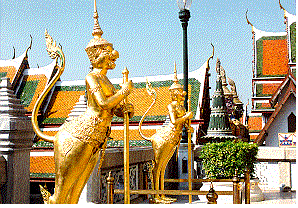 |
Die bekannteste Sehensw�rdigkeit in Bangkok ist
der "Gro�e Palast".
Es sind 2 verschiedene Geb�ude: Wat Phra Keo (Wat bedeutet Tempel) und der Palast selbst. |
Der Wat Phra Keo
wurde 1782 in den Mauern des Palastes gebaut (das Jahr, in dem Bangkok Hauptstadt wurde).
Jeder K�nig f�gt seitdem "sein Geb�ude" hinzu, so da� alles sehr konfus und
eng ist.
Der Wat Phra Keo ist das Zuhause des "Smaragd Buddhas" (der aber aus Jade ist
!), Symbol der Chakri-Dynastie, die seit 1782 Thailand regiert. Diese Statue besitzt 3
M�ntelchen. Sie werden zu Beginn jeder Jahreszeit vom K�nig pers�nlich
gewechselt.
Der K�nig wohnt nicht mehr im Gro�en Palast. Er wird nur noch f�r offizielle
Anl�sse genutzt.
|
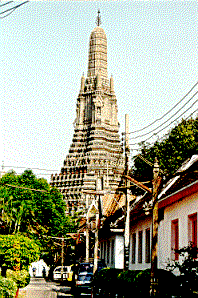 |
Der Wat Arun (Temple der Morgenr�te) befindet sich auf der
anderen Seite der Chao Praya River und war urspr�nglich das Zuhause vom Smaragd Buddha. Seine
Besonderheit sind die Verzierungen aus chinesischen Porzellanscherben. Diese Scherben
dienten als Ballast f�r die chinesischen Handelsschiffe. |
 | Koh Phi Phi, Thailand (Koh bedeutet Insel)
|
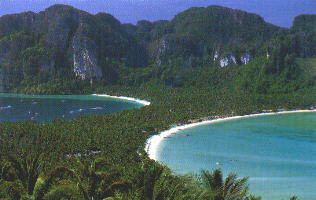 |
Am 1. Mai Wochenende hatten wir Lust auf Sonne... auf nach Koh Phi Phi.
Es sind 2 kleine traumhafte Inseln mit t�rkisem Wasser und Str�nden mit weissem Sand. |
| Man kann nur per Schiff von Phuket oder Krabi nach Phi Phi
kommen. Auf Koh Phi Phi gibt es keine Stra�en, Strom funktioniert nicht zwischen
mittags und 15 Uhr und man mu� oft mit Meereswasser duschen, wenn es kein S��wasser
mehr gibt !
Dort sind wir zum ersten Mal getaucht... unvergesslich. Im warmen und klaren Wasser
sind wir durch ein mit bunten Pflanzen bedeckten Canyon geschwommen.
Die Insel wird sicherlich sehr popul�r werden... Leonardo di Caprio ist f�r einen
neuen Film angek�ndigt. Beeilt Euch ! |
 | Kambodscha
|
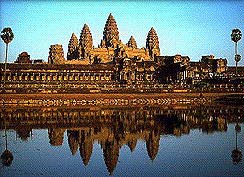 |
4 Tage lang haben wir auf den Spuren der Khmer Kambodscha entdeckt. Die
Khmer haben in einem Reich, das weit bis nach Thailand hinein reichte ca. 600 Jahre (von
802 bis 1432) die Region beherrscht. |
| Von dieser Zeit sind viele Tempel geblieben, der bekannteste
ist Angkor Wat (auf dem Bild). Mit einem F�hrer und einem Fahrer haben wir die
verschiedenen Tempel besichtigt. Wir haben vieles gelernt und ein sch�nes Land entdeckt,
das noch nicht sehr f�r den Tourismus ge�ffnet ist.
Auf dem Land wohnen die Bauern in einer kleinen Bambush�tte mitten in Reisfeldern.
Barfu�, mit der Hilfe von Wasserb�ffeln, bestellen sie die Reisfelder.
Die Kinder der Umgebung belagern die Touristen mit Postkarten, T-shirts und anderen
selbstgemachten Souvenirs. |
 | Hong Kong und Makao
|
 |
Von Bangkok aus ist eine Reise nach Hong Kong viel einfacher ! Die Ankunft
auf dem neuen Flughafen ist nicht mehr so beeindruckend wie fr�her (er ist etwas
au�erhalb auf einer k�nstlichen Insel gebaut) aber |
| die Stadt steht immer noch stolz zwischen Meer und Bergen.
Die Hochh�user von Hong Kong Island schliessen den Victoria Peak ein (Bild). Gegen�ber
liegt Kowloon Island. |
Makao, ein portugiesische Enklave an der S�dkuste von China liegt nur 65
km von Hong Kong entfernt.
1999 wird Makao, genauso wie mit ihrem Nachbar Hong Kong bereit geschehen, in das Reich
der Mitte zur�ckkommen.In Makao fanden wir ein bi�chen Europa: ein weitl�ufiger
Platz bildet das Zentrum der Stadt, die Gesch�fte sind unter |
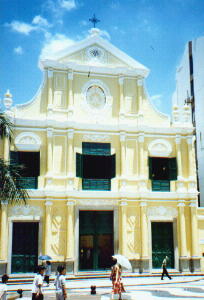 |
| Arkaden und neben pastell- farbenen Pal�sten befinden sich
barocke Kirchen. |
 | Koh Samui, Thailand
|
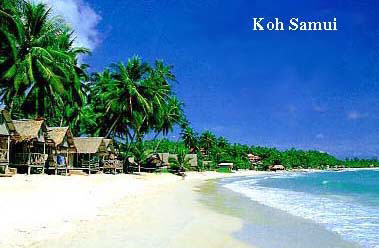 |
Mit Kerstin und Reinhard sind wir, Anfang September, f�r eine Woche nach
Koh Samui geflogen.
Koh Samui liegt im Golf von Thailand und ist leicht mit dem Flugzeug von Bangkok
erreichbar. |
| Koh Samui hat uns sehr gut gefallen: die Leute sind
freundlich und l�cheln, die Bungalows versteckt unter Kokuspalmen gebaut, die Str�nde
sauber und ruhig, wenn man Chaweng Beach meidet, wo sich die meisten Touristen
treffen, um das Nachtleben und die Restaurants zu geniessen. Mit Mofas haben wir die
Insel samt ihrer sch�nen Wasser- f�lle und wunderbaren Landschaften erkundet.
Schnorcheln oder Tauchen kann man auf Koh Samui oder auf Koh Tao (Nachbarinsel) auch sehr
gut: bunte Fische essen direkt aus der Hand ! |
 | Kanchanaburi und die Br�cke am Kwai, Thailand
|
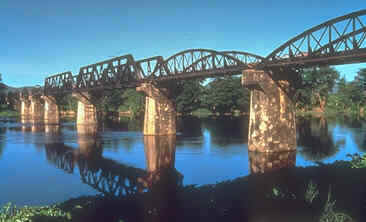 |
Die Bahn des Todes wurde im 2. Weltkrieg unter der Aufsicht der Japaner
von den Allierten Kriegsgefangenen gebaut und sollte Siam (ehemaliger Name von Thailand)
mit Indien verbinden. |
| Dschungel, Hitze und Krankheiten kosteten auf der Strecke
zwischen Thailand und Burma einen Toten pro Bahnschwelle. Symbol und Mahnmal ist heute die
Br�cke �ber den Kwai Flu�, die auf den originalen Tr�gern errichtet ist. In der
Umgebung dieser Attraktion befinden sich Nationalparks, die mit Wasserf�llen viele
Touristen anlocken. |
 | Beijing, China
|
 |
Vom 12. bis 16. Dezember, w�hrend Eckart gesch�ftlich in
Vietnam war, hat Sylvie mit einer Gruppe vom Floraville Beijing besichtigt. Bei einem
sch�nen aber sehr kalten Sonnenschein sind wir durch die Verbotene Stadt (Bild) gegangen.
|
| Hier haben die Kaiser von den Dynastien Ming und
Quing mit ihren Familien vom XV. Jahrhundert bis 1911 gelebt. Der letzte Kaiser, Pu-Yi,
hat 1911 abgedankt und die Volksrepublik von China wurde gegr�ndet. |
| 80 km von Beijing entfernt kann man die gro�e Mauer von China erkunden.
Mit mehr als 6000 km l�uft sie �ber Berge und T�ler. Der Himmelstempel (Bild), gebaut
im Jahre 1420, hat mir am besten gefallen. W�hrend der Opferzeremonien ist der Kaiser,
begleitet von 2000 Dienern und Tr�gern, durch die langen G�ngen des Tempels von |
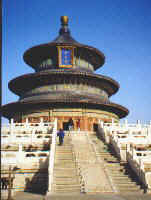 |
| der Erde bis zum Himmel gegangen, um den G�ttern zu
huldigen. |
 | Singapur
|
 |
Ende Januar, auf dem Weg nach Neuseeland machten wir einen 2
t�gigen Zwischenstop in Singapur. Wir entdeckten eine ultra-moderne (die Singapur
Glass-U-Bahn ist weltber�hmt) und extra-saubere |
Stadt (z.B. Kaugummis sind einfach verboten !).
Eine ganz andere Welt als Bangkok ! |
Im Jahre 1829 hat der Brite Sir Stamford Raffles (oben seine Statue) die
Insel Singapur gekauft. Sie wurde schnell ein wichtiger Handels-
umschlagsplatz in Asien.70 % der Bev�lkerung sind chinesiche Ursprungs, die am Ende
des 19. Jahrhunderts aufgrund der Entwicklung der Gummiplantagen gekommen sind. |
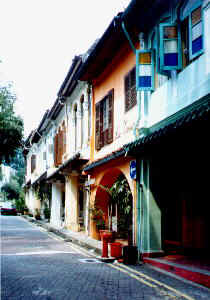 |
| Das ehemalige chinesiche Viertel (rechts) wurde renoviert und
ist jetzt eine sehr begehrte Wohngegend in der Stadtmitte. |
 | Vietnam
|
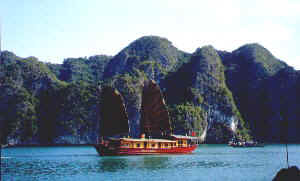 |
Zum 52. Kr�nungstag des thail�ndischen K�nigs sind wir 5 Tage durch
Vietnam gereist: Saigon, Hanoi und die wundersch�ne Halong Bucht. |
Diese 5 Tage waren wie eine Reise in die Vergangenheit...
Zuerst Saigon: eine Stadt im Wandel zur Moderne: die ersten Hochh�user entstehen, auf den
Stra�en bewegt man sich nach wie vor mit den Fahrrad und dem Mofa fort. |
| In der Umgebung haben wir die Tunnel von Cu Chi besucht. Die Vietnamesen
haben w�hrend des Indochina Krieges und sp�ter w�hrend des Vietnam Krieges ein
Tunnelsystem von �ber 200 Km, drei Stockwerke tief in die Erde gegraben, um sich vor den
Feinden zu sch�tzen. |
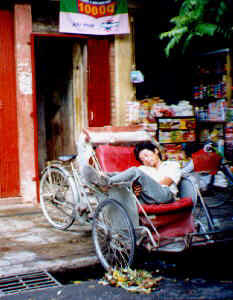 |
| In Hanoi haben wir das alte Viertel mit dem Fahrrad-Rikscha
erkundet. Jede Stra�e beherbergt ihr eigenes Handwerk. Wie vor 400 Jahren gehen die
Arbeiter ihrer T�tigkeit nach. Mit der Dschunke (oben) haben wir die vielen Felsinseln
der Halong Bucht bewundert. |
Back to the top

Venez... nous vous emenons en voyage �
travers l'Asie du sud-est...
Depuis notre arriv�e en Tha�lande en avril 98, nous essayons de profiter
autant que possible des jours f�ri�s et week-ends prolong�s pour d�couvrir cette
r�gion.
Voici un petit aper�u de ce que nous avons fait jusqu'� maintenant... en
esp�rant vous donner envie !
 | Bangkok (Krungthep en tha�)
|
Il y a beaucoup de choses � voir � Bangkok et nous ne voulons pas faire
office de guide, mais voici quelques images...
 |
Le monument le plus connu de Bangkok est le
"Grand Palace".
En fait il y a 2 monuments: le Wat Phra Keo (Wat signifie temple) et le Palais lui-m�me.Le
Wat Phra Keo a �t� �rig� dans l'enceinte du palais en |
1782 (ann�e o�
Bangkok devint la capitale). Chaque monarque y ayant rajout� des constructions,
l'ensemble est assez confu et ress�r�.
Le Wat Phra Keo abrite le c�l�bre Bouddha d'�meraude (qui est en fait en jade !),
symbole de la dynastie Chakri, toujours r�gnante depuis 1782. Cette statue poss�de trois
petits manteaux, une pour chaque saisons, qui sont chang�s par le roi en personne.
Le Grand Palace, quant � lui, n'est utilis� par le roi que pour certaines
c�r�monies officielles |
 |
Le Wat Arun (temple de l'aube) se trouve sur l'autre rive du
Chao Proya River et fut la premi�re demeure du Bouddha d'�meraude avant que le Wat Phra
Keo soit construit.
Sa particularit� est qu'il est recouvert de pl�tre incrust� d'une mosa�que de d�bris
de porcelaine chinoise. Ces d�bris servaient de leste aux navires chinois commer�ant
avec la Tha�lande. |
 | Koh Phi Phi, Tha�lande (Koh signifie �le)
|
 |
Pour le 1er mai, nous avons d�cid� de prendre un peu le soleil... nous
avons mis le cap sur Koh Phi Phi.
Ce sont 2 petites �les paradisiaques aux eaux |
| turquoises et plages de sable blanc. On ne peut y
acc�der qu'en bateau depuis Phuket ou Krabi. A Koh Phi Phi, il n'y pas de route,
l'�lectricit� est coup�e entre midi et 15 heures et souvent on se douche � l'eau de
mer quand le stock d'eau douce est fini !
Nous y avons fait notre bapt�me de plong�e sous-marine... inoubliable. Dans de l'eau
chaude et claire, nous avons nag� dans un canyon sous-marin recouvert de plantes de
toutes les couleurs.
L'�le va certainement devenir plus populaire... Leonardo di Caprio y est annonc� pour
le tournage d'un nouveau film. D�pechez-vous ! |
 | Cambodge
|
 |
Nous sommes partis 4 jours au Cambodge, sur les traces de l'empire Khmer
qui eut son heure de gloire pendant pr�s de 600 ans, de 802 � 1432. De cette p�riode
sont rest�s de |
| nombreux temples dont le plus connu est Angkor Wat (sur la
photo). Un guide et un chauffeur nous ont fait visiter les diff�rents temples. Nous
avons appris beaucoup de choses et d�couvert un pays qui n'est pas encore tr�s ouvert au
tourisme. Dans les campagnes, les paysans vivent dans leur petite maison de bambou au
milieu des rizi�res qu'ils cultivent encore � la charrue tir�e par un z�bu, marchant
les pieds nus dans l'eau.
En guise de boutiques de souvenirs, ce sont les enfants des villages avoisinants qui
vendent cartes postales, T-shirts ou autres objets qu'ils ont confectionn�. |
 | Hong Kong et Macao
|
 |
Depuis Bangkok un passage � Hong Kong �tait obligatoire ! L'arriv�e sur
le nouvel a�roport est moins impressionante qu'avant (il est construit � l'ext�rieur de
la ville sur une �le artificielle) |
| mais la ville se dresse toujours fi�rement entre mer et
montagnes. Les buildings serr�s les uns contre les autres de Hong Kong Island recouvrent
le Victoria Peak (photo). En face c'est la presqu'�le de Kowloon. |
| Macao, enclave portugaise situ�e sur la c�te sud-est de la Chine n'est
qu'� 65 km de Hong Kong. En 1999 Macao subira le m�me sort que sa voisine Hong Kong en
devenant une "province sp�ciale" de la Chine. A Macao nous avons retrouv� un
peu l'Europe: un centre ville construit autour d'une place principale, boutiques sous des |
 |
| arcades, palais aux couleurs pastels et �glises baroques. |
 | Koh Samui, Tha�lande
|
 |
C'est avec Kerstin et Reinhard que nous sommes all�s passer, d�but
septembre, 1 semaine � la plage � Koh Samui.
Koh Samui se trouve dans le golf de Tha�lande et on y acc�de facilement |
| en avion depuis Bangkok. Nous avons beaucoup aim� Koh
Samui: les gens sont accueillants et souriants, les hotels discr�tement construits sous
forme de bungalows sous les cocotiers, les plages propres et tranquilles pour peu qu'on ne
s'installe pas � Chaweng Beach o� la plupart des touristes se retrouvent.
Avec des scooters, nous avons sillonn� l'�le � la d�couverte de cascades d'eau et
de paysages magnifiques.
La plong�e sous-marine ou avec masque et tuba sont de vrais plaisirs ici ou � Koh Tao
(�le voisine de Samui): des poissons multicolores viennent manger dans vos mains! |
 | Kanchanaburi et le pont sur la rivi�re Kwa�
|
 |
Le train de la mort fut construit, pendant la deuxi�me guerre mondiale,
par les prisonniers de guerre alli�s sous direction des Japonais. Cette voie ferr�e
devait relier le Siam (ancien nom de la Tha�lande) � l'Inde. |
| La jungle, la chaleur et les maladies cout�rent la vie � un
prisonier par traverse pos�e entre la Thailande et la Birmanie. Aujourd'hui, la voie
est toujours en service. L'actuel pont sur la rivi�re Kwai construit sur les piliers
d'origine est un t�moignage des cruaut�s de la guerre.
Dans les environs de ce pont tristement c�l�bre, de nombreux parcs nationaux avec des
cascades impressionantes attirent les visiteurs. |
 | Beijing / P�kin, Chine
|
 |
Du 12 au 16 d�cembre, pendant qu'Eckart �tait au Viet-Nam
en voyage d'affaires, Sylvie a profit� d'un tour organis� par le Floraville pour visiter
P�king. Par un superbe soleil mais un froid sib�rien, nous avons
d�couvert la |
| cit� interdite (ci-dessus) habit�e par les
empereurs chinois des dynasties Ming et Quing et leurs familles � partir du XV�me
si�cle jusqu'en 1911, date � le dernier empereur Pu-Yi abdiqua face aux Japonais pour
fonder la R�publique populaire de Chine. |
| A 80 km de P�kin seulement, nous avons gravi les marches escapr�es de la
grande muraille de Chine qui jalonne montagnes et plaines sur plus de 6000 km. Le temple
du ciel (ci-contre), construit en 1420, a �t� mon coup de coeur. Lors des c�r�monies
des sacrifices, l'empereur, |
 |
| accompagn� de plus de 2000 serviteurs et porteurs,
parcourait les longues all�es du temple pour rejoindre la terre au ciel et donc les
dieux. |
 | Singapour
|
 |
Fin janvier, sur notre route pour la Nouvelle Z�lande, nous
faisons une halte � Singapour pour 2 jours. Nous d�couvrons une ville ultra-moderne
(son metro |
| en verre est bien connu), super-propre (les
chewing-gums par exemple sont interdits !) qui nous change bien de Bangkok ! |
| C'est en 1829 que le Britanique Sir Stamford Raffles (ci-dessus sa statue
!) acheta l'�le et en fit un comptoire commercial � l'essor rapide. Singapour �tait une
escale appreci�e sur la grande route maritime contournant l'Asie. La ville est peupl�e
� plus de 70 % par des Chinois de souche venus � la fin du XIX �me si�cle lors du
d�veloppement de la culture du caoutchouc. |
 |
| Ci-contre, les anciens quartiers chinois enti�rement
r�nov�s en logements tr�s pris�s au plein centre-ville ! |
 | Vietnam
|
 |
A l'occasion du jour f�ri� en Tha�lande pour le 52�me anniversaire du
couronnement roi, nous avons parcouru le Vietnam pendant 5 jours: Sa�gon, Hanoi et la
fameuse baie d'Halong. |
Ces 5 jours ont �t� comme en voyage dans le temps...
Tout d'abord Sa�gon: c'est une ville qui commence � se moderniser: les premiers grands
immeubles apparaissent, mais on circule encore plus en mobilette ou � v�lo qu'en voiture
! |
| Aux alentours, nous avons visit� les tunnels du Cu Chi. Il s'agit d'un
v�ritable labyrinthe sous-terrain de plus de 200 km que les Vietnamiens ont construit
lors de la guerre d'Indochine et agrandit pendant la guerre du Vietnam contre les
Am�ricains. Nous avons d�couvert les vieux quartiers |
 |
| de Hanoi en pousse-pousse, nous laissant guider par notre
chauffeur. On retrouve ici encore le regroupement par confreries: chaque rue a sa
sp�cialit� etc'est un vrai spectacle � chaque pas de porte ! C'est en jonque
(ci-dessus) que nous avons navigu� dans la baie d'Halong: paysages magnifiques de plus de
3000 pains de sucre sortant d'une eau vert sombre ! |
Back to the top

Come on... let's discover South East Asia...
Since our arrival in Thailand in April 98, we try to travel as often as possible to
discover the beauty and history of this part of the world.
We like to share some of the highlights with you... have a chance to come here yourself
!
 | Bangkok (Krungthep in thai)
|
There are many things to do and to see in Bangkok. We don't want to write
our own guide, but a few pictures can give you a first impression...
 |
The most famous temple in Bangkok is the
"Great Palace". Within this palace are 2 buildings: Wat Phra Keow (Wat means
temple) and the palace itself. Wat Phra Keow was built in |
the year 1782 within
the grounds of the Great Palace, in the same year which Bangkok became the capital of
Thailand.
Every king added his building to the complex resulting in today's crooked structure.
The Wat Phra Keow is the home of the "Emerauld Buddha" (which is
actually made of jade), symbol of the Chakri dynasty, who reign Thailand since 1782. The
statue has got 3 dresses, one for each season. The king himself changes the dresses.
The king does not live in the Great Palace anymore. It is only used for
official ceremonies. |
 |
Wat Arun (temple of the dawn) is located on the other side of
the Chao Praya river and was the original home of the Emerauld Buddha. His particularity
are the ornaments made of debris of china. The debris served as ballast for the Chinese
merchant fleet. |
 | Koh Phi Phi, Thailand (Koh means island)
|
 |
The first weekend in May we were longing for sunshine... let's go to Koh
Phi Phi.
Two paradise like islands with turquoise water and white sandy beaches. The only way to
get |
| there is by boat from Krabi or Phuket. There are no streets
on these islands, electricity is off between midday and late afternoon and the shower
works only during rainy season - otherwise you have to shower with saltwater or carry
drinking water to your bungalow.
Off Phi Phi we dived for the first time... unforgettable. The water was warm and cristal
clear, colourful waterplants alongside the reef and an underwater canyon.
Watch out this island will become very popular soon... Leonardo di Caprio is staring
for a new Hollywood film on the beaches of Koh Phi Phi. Hurry up... ! |
 | Cambodia
|
 |
During 4 days, we discovered the ancient Khmer empire. The Khmer have
reigned the South East Asian region ranging from Thailand to Laos, Cambodia and Vietnam
over a period of 600 years (802 to 1432). |
| The tempels have survived not only many wars, but also the
growing rain forest. The most famous one is Angkor Wat (see picture) though the other
tempels like Bantey Srei are not less spectacular. Together with our guide and driver we
visited some of the remote areas around Angkor. Cambodia is not yet really opened for mass
tourism, and people in the countryside still continue the same lifestyle as 600 years ago
- bamboo huts, rice farming barefoot and waterbuffalos.
Their children have started a new profession: selling postcards, T-shirts and souvenirs to
tourists. |
 | Hong Kong and Macao
|
 |
It's only a short trip from Bangkok to Hong Kong by air. Landing there is
not as exciting as it used to be. The new airport is positioned well away from the
skyscrapers on an artificial island. |
| Still Hong Kong has not lost any of its character since being
a part of Red China. The skyscrapers embed the hights of the Victoria Peak (picture).
Opposite is Kowloon island. |
Macao, a portugese enclave, situated on the South coast of China is only
65 km away from Hong Kong.
in 1999, Macao will be returned to "Great China".In Macao we enjoyed the
European flair: an open place serves as the town center with shopping arcades and next to
thepastell coloured buildings are baroques style churches. |
 |
 | Koh Samui, Thailand
|
 |
We spent the first week of September together with Reinhard and Kerstin in
Koh Samui, situated in the gulf of Thailand.
Although there is a direct flight from Bangkok almost every hour one |
| can still find remote beaches. It is definitely a touristic
highlight: the people are friendly and smiling, the bungalows are well hidden under the
coconut palm trees, the beaches are clean and tranquil, except maybe Chaweng Beach, which
offers lots of restaurants and exciting night life.
We toured the island by scooter, strolling along the wonderful countryside and trekking
to waterfalls.
Koh Samui offers also snorkeling and diving - our quiet tip: take a trip to Koh Tao
(neighbouring island) where the tropical fish eat out of your hand. |
 | Kanchanaburi and the bridge over river Kwai, Thailand
|
 |
The Death Railway was built by the allied prisoners of war during the
second world war under the supervision of the Japanese. It purpose was to link Siam (old
name of Thailand) |
with India by land. Jungle, heat and deseases cost approx.
one life for every sleeper between Thailand and Burma.
Today, the famous bridge over the river Kwai which is still in use and which is built on
the original pillars, stands as a memorial for the cruelties of the second world war.Nearby,
the inglorious sight are beautiful national parks, that attract many tourists with their
plenty cascades. |
 | Beijing, China
|
 |
From 12th to 16th December, while Eckart went on a business
trip to Vietnam, Sylvie joined a tour group organised by Floraville to visit Beijing. Clear,
crips blue sky was over our |
| tour through the Forbidden City (picture above). Here, the
emperors of the Mingh and Quing dynasties together with their families have resided from
the 15th century to 1911. The last emperor, Pu-Yi, has stepped down in 1911 ans
consequently the People's Republic of China was founded. |
| The Great Wall of China is situated 80 km outside Beijing. The Wall
stretches more than 6000 km over mountains and valleys. I liked best the Temple of
Heaven (picture), built in 1420. During the sacrifice ceremonies, the emperor, accompanied
by |
 |
| 2000 servants and porters, walked through the long aisles of
the temple resembling the walk from the earth to heaven to worship the gods. |
 | Singapore
|
 |
End of January, on our way to New Zealand, we took a stop over
of two days in Singapore. We discovered a very modern (its glass subway is world famous)
and very tidy metropoly. It's also called the 'fare' city, having to pay fines to chewing
gums. |
| A totally new experience to Bangkok! |
| In the year 1829, the British Sir Stamford Raffles (his statue above)
bought the island Singapore. Very quickly, it emerged as a major trading post in South
East Asia. 70 % of today's population is Chinese, originating from the 19th century
when the rubber industry was booming in Singapore. |
 |
| The former Chinese quarter (right) has been renovated and is
now a very popular residential area in the city centre. |
 | Vietnam
|
 |
To celebrate the 52nd Coronation Day of the King of Thailand, we travelled
five days through Vietnam: Saigon, Hanoi and the wonderful Hanoi Bay. |
It was going to be journey into the past....
First of all Saigon: a city on the merge to the modern world: skyscrapers are being built
with high tech offices whereas bicycles and mopeds are prevailing on the streets. |
| Just outside of Saigon, we visited the tunnels of Cu Chi. The Vietcong
built a sophisticated, three level deep tunnel system in order to survive and to fight
their oponents in the Indochina War and the Vietnam War. The 200 km long tunnels consisted
not only of hiding places, but also hospitals, kitchen facilities and meeting rooms.
|
 |
| In Hanoi we toured the 'Old Quarter' on a riksha. Every
street accomodates still its craft like 400 years ago. The craftsmen are pursuing their
trade as if time never past. Another highlight was the day-trip with a junk through the
thousand small islands of the Halong Bay (picture see above). |
Back to the top
|
